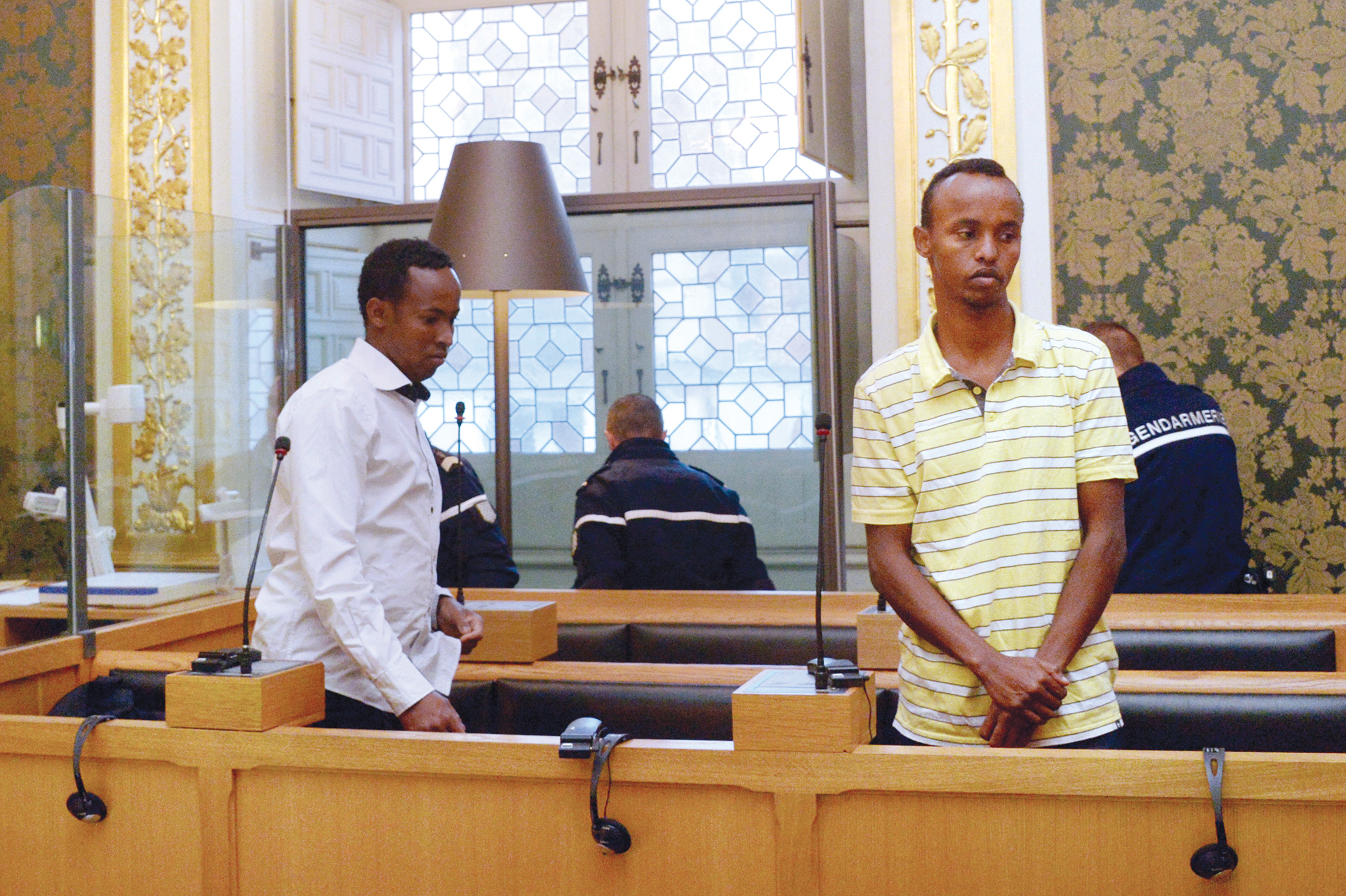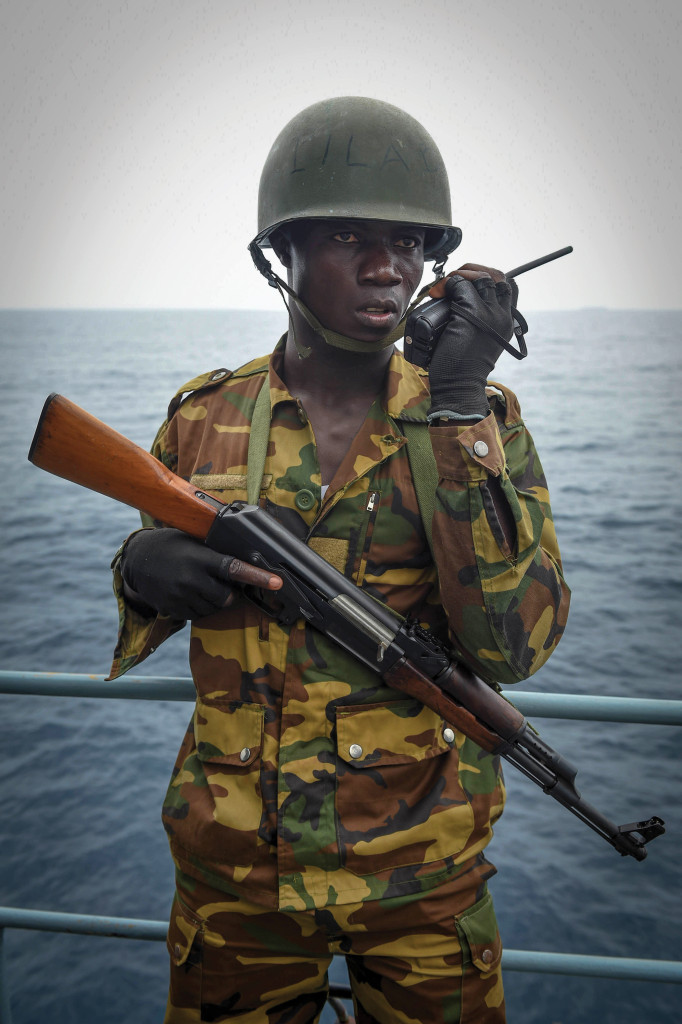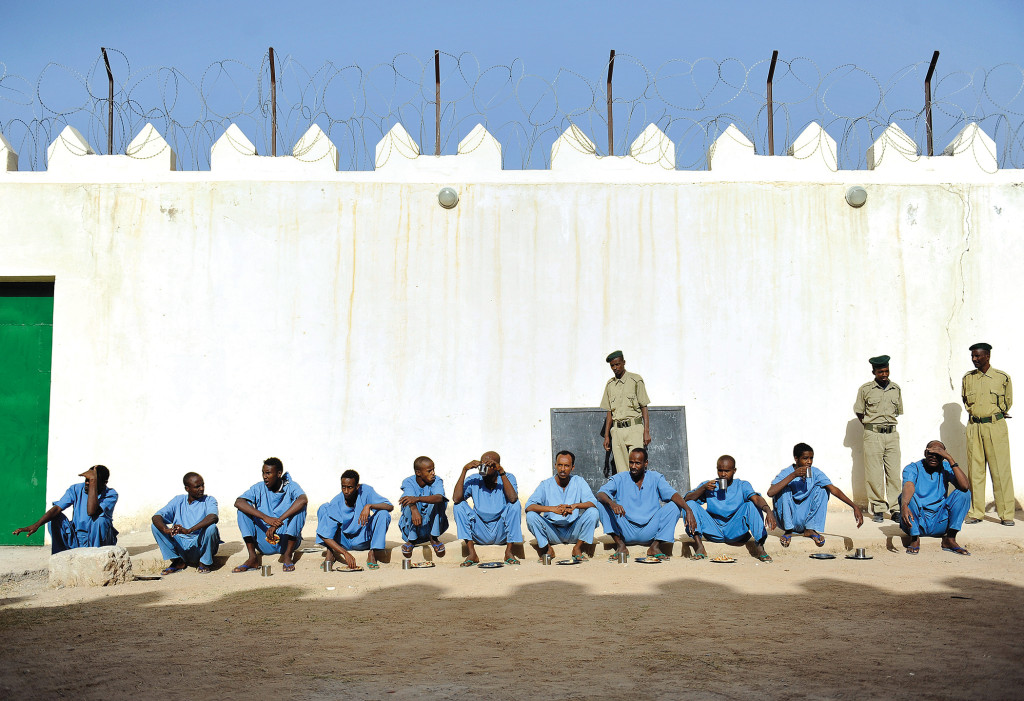Legal experts call for closing loopholes to prosecute pirates
In an interview on board a Ukrainian freight vessel, Somali pirates bragged that they had outsmarted the system. They said they could hijack a commercial ship, knowing that the ransom payments could be worth millions and if they were caught, it would pose no problem. In their words, they would just get a “free ride back to the beach” from one of the dozens of international naval ships patrolling the area.
“They can’t stop us — we know international law,” Jama Ali, a pirate, told The New York Times in 2008.
Ali may have been emboldened by the lack of punishment, but his assessment of international law was dead wrong. In fact, international law pertaining to piracy is among the toughest in the world. It gives those who arrest pirates great latitude to detain them and bring them to face justice on shore.
For centuries, all nations have been permitted to arrest pirates caught on the high seas, now defined as water farther than 12 nautical miles from a coastline. Pirates hold a uniquely reviled status in the eyes of the law because they imperil international trade and travel. The legal term used to describe them is “hostis humani generis,” a Latin phrase that translates to “an enemy of all mankind.”
The U.N. Convention of the Law of the Seas (UNCLOS), adopted in 1982, reflects the seriousness of the crime. It says stopping piracy is not only a right, but a duty. “Any State having an opportunity [to take] measures against piracy, and neglecting to do so, would be failing in a duty laid upon it by international law,” the UNCLOS states.
So why is this duty so rarely fulfilled? The question is particularly pressing because West African piracy has emerged and presents some the same legal hurdles faced for years off the coast of East Africa.
Legal Limbo
The early years of Somali piracy were characterized by what was termed a “catch-and-release” system. Pirates were captured and then simply returned to the nearest port. The toughest punishment most faced was to have their weapons confiscated or, in some cases, their boats destroyed.
A 2011 report by Jack Lang, special advisor to the U.N. secretary-general, found that nine out of 10 suspected pirates captured off the coast of Somalia were released without being prosecuted. Piracy legal expert Yvonne Dutton said a “culture of impunity” reigned.
This was not due to apathy. Prosecuting pirates is a difficult task.
Since the 1930s, pirates have been considered civilians instead of combatants under international law. This places an added burden of proof on naval patrols that seek to arrest them. Once caught, many pirates insist they are simple fishermen who have been falsely accused. The burden is on arresting authorities to prove otherwise.
“Given that pirates are civilians on board civilian vessels, patrolling navies can do little until the suspects attempt to board another ship,” Eugene Kontorovich wrote in the article “A Guantanamo on the Sea: The Difficulty of Prosecuting Pirates and Terrorists,” published in California Law Review. “International law does not criminalize being on a Somali fishing vessel, even if the only pieces of ‘fishing equipment’ on board are AK-47s and RPGs.”
Worse still, if authorities use too much force while arresting pirates, the navies themselves could be charged with violating international humanitarian law. At the height of the Somali piracy problem, Britain went as far as to urge its ships not to capture suspected pirates for fear they would claim asylum under European Union human rights law.

Some have complained that UNCLOS actually makes capturing pirates more difficult because the 1982 treaty extended territorial waters from 3 nautical miles offshore to 12 miles. This means that when there is a weak state, such as is case with Somalia, pirates can take advantage of the lack of capacity in territorial waters. This problem was rectified during the Somali piracy crisis when foreign navies were allowed to enter Somali waters and use “all necessary means to repress piracy,” according to a U.N. Security Council authorization.
As difficult as it is to capture pirates, putting them on trial is equally onerous. Navies are not typically trained to collect and preserve evidence so it can be used in court. Once a trial begins, it can be difficult to locate arresting authorities, multinational crews of ships and corroborating witnesses. People needed to testify are often “scattered around the world” by the time the trial starts, Kontorovich wrote. Finding adequate defense counsel and translation services for pirates also is difficult.
Given the cost and complexity, it is little wonder that East African and European nations have not been eager to arrest or try pirates. Two positive examples are Kenya and the Seychelles, which have tried dozens of Somali pirates after receiving money from the U.N. and member nations to set up special courts.
Some legal scholars, however, question the validity under UNCLOS of transferring pirates to a third-party state such as Kenya or the Seychelles. Legal scholars have argued that universal jurisdiction was intended to apply only to the arresting nation.
“If nations that make the arrest are unwilling to prosecute, then releasing the defendant may be a proper outcome — a legitimate exercise of prosecutorial discretion,” Kontorovich wrote. “Auctioning prosecution to the lowest bidder, while defensible, can also raise concerns about due process and related issues.”
Gulf of Guinea learns lessons
Cmdr. Kamal-Deen Ali, legal director of the Ghana Navy and director of research at the Ghana Command and Staff College, is worried that history might repeat itself in the Gulf of Guinea (GoG). He does not want “catch and release” to become the norm in West Africa.
Kamal-Deen told ADF that the greatest need is for each of the GoG countries to adopt anti-piracy legislation. Currently, he said, only Liberia and Togo have up-to-date and adequate anti-pirate legislation. “What it means is that you may be able to apprehend pirates, but at the end of the day you can only keep them for so long if you will not be able to provide adequate legislation upon which they can be prosecuted,” Kamal-Deen said. The four greatest areas of need are as follows:

Legal framework: New comprehensive legislation would include legal tools to define, investigate, prosecute and punish piracy. It also would provide for judicial cooperation between countries, allowing for the extradition of pirates to their home countries for trial if needed, and the exchange of judicial information among countries.
It cannot be a patchwork solution, Kamal-Deen said. It will be essential that GoG countries all adopt legislation because it is likely that investigations, arrests and prosecutions will span the territorial waters and land of several countries. Although legislation will be specific to the judicial systems of separate countries, the Yaoundé Code of Conduct, signed by more than 20 countries in 2013, outlines maritime piracy, robbery at sea and other transnational organized crimes. It calls for countries to strengthen national laws and harmonize them across the region.
“When you do not have that legislation, then your ability to prosecute pirates can be challenged,” Kamal-Deen said. “That’s the situation we have in the Gulf of Guinea.”
Articles of crime: Kamal-Deen said it is also necessary for GoG countries to have “articles of crime” legislation through which suspected pirates can be prosecuted if they are caught with the tools of piracy, even if they are not caught in the act of boarding or after having hijacked a ship. “Where you are found, for example, with a speedboat loaded with AK-47s off the coast of Ghana or off the coast of Nigeria, the presumption is that you are going to commit piracy unless you can prove otherwise,” he said. “These kind of articles of crime legislation are very important within the context of the Gulf of Guinea.”
Defined borders: Kamal-Deen said an underlying factor inhibiting cooperation among GoG nations to defeat piracy relates to maritime boundary disputes. When nations do not agree where the boundaries are, it “tends to inhibit cooperation,” he said. He believes it is time for countries to resolve these disputes in the interest of broader public safety. “The reality is that unresolved boundary issues will always impact maritime security cooperation, including information sharing, from strategic through operational to the tactical levels,” Kamal-Deen said. For instance, he said, an ongoing maritime border dispute between Ghana and Côte d’Ivoire has the potential to limit information sharing between the two countries.
Courts and training: Training of seamen, police, attorneys and others will be necessary to ensure that pirates are captured and transferred humanely, evidence is preserved, and the accused receive a swift and fair trial. Nigerian Rear Adm. Adeniyi Adejimi Osinowo has called for beefing up the West African legal system to handle an influx of piracy cases. It must, he said, be a regional effort because the waters of the GoG are shared, and pirates will search out and exploit weak areas. “Efforts to fast-track extraditions and to synchronize penalties for crimes at sea across jurisdictions would prevent pirates from finding more lenient treatment across coastal boundaries,” Osinowo wrote in a security brief for the Africa Center for Strategic Studies. Osinowo also pushed for the creation of courts dedicated to handling piracy and sea robbery and additional training for special prosecutors.
From Sea to Prison
Legal barriers make prosecuting pirates difficult
HIGH SEAS
The United Nations Convention of the Law of the Seas, adopted in 1982, defines a country’s territorial waters as extending 12 nautical miles from shore. Although intended to protect national sovereignty, pirates have sought out the territorial waters of weak or failed states and have operated with impunity.
RELEVANT LAWS
Piracy was all but unheard of until its resurgence off the coast of Somalia in the past decade. Consequently, most African nations have outdated or inadequate laws criminalizing piracy. Cmdr. Kamal-Deen Ali, legal director of the Ghana Navy, said Togo and Liberia are the only West African nations that have up-to-date anti-piracy laws.
IN THE ACT
International law views pirates as civilians instead of combatants. This means authorities must observe them in the act of boarding or holding a ship to charge them. Some have advocated for the adoption of “articles of crime” legislation in African countries, which would criminalize the possession of equipment associated with piracy such as AK-47s and grappling hooks in some circumstances.
PRESERVING EVIDENCE
Maritime arresting authorities such as navies are typically not trained to preserve evidence of a crime like piracy or to take witness statements from relevant parties once they liberate a hijacked vessel. As a result, crucial evidence needed to convict pirates in court can be lost.
MULTIPLE JURISDICTIONS
Cases of piracy on the high seas often involve pirates from one country, victims and a hijacked vessel from a second country, and authorities from a third country. Transferring evidence, sharing information, extraditing suspects and other matters require international cooperation.
FINDING A COURT
Nations have been understandably hesitant to try pirates due to the cost and complexity of the cases. The U.N. has helped fund special piracy courts in the Seychelles and Kenya, but critics have questioned their legitimacy because neither the pirates nor the arresting parties are typically from either of those countries.

